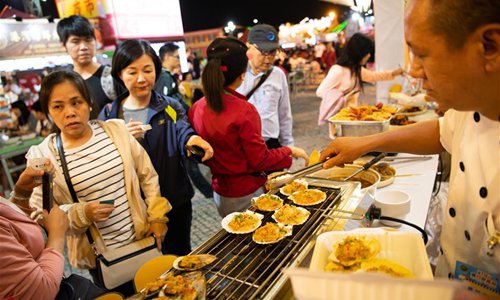HOME >> CHINA
Mainland moves to better integrate HK, Macao in culture and tourism
By Wang Qi Source:Global Times Published: 2019/11/20 21:12:22

Visitors select food in the 19th Macao Food Festival at Sai Van Lake Square in Macao, south China, Nov. 8, 2019. The 19th Macao Food Festival kicked off in Macao on Friday with about 160 food stalls to serve the visitors. (Xinhua/Cheong Kam Ka)
China's Ministry of Culture and Tourism is soliciting ideas for cultural and tourism projects between the mainland and Hong Kong and Macao special administrative regions in 2020, a move experts hailed will facilitate mutual understanding.
The schemes include organizing youths from Hong Kong and Macao to communicate with their mainland peers, conduct research and participate in public service activities in the mainland.
Cultural and tourism institutes from the three places are also encouraged to cooperate, help bolstering cooperation in those industries and building a platform to cultivate talent. For example, mainland cultural institutions are encouraged to work with their counterparts from Hong Kong and Macao in performances, cultural relics and creative cultural products in the mainland.
Youths from the mainland will be invited to visit grass-roots communities in Hong Kong and Macao, and participate in cultural activities during national holidays, the ministry's document said.
Due to their colonial past, some Hong Kong and Macao youths do not have a deep understanding of Chinese history and culture like their mainland peers. The ongoing Hong Kong unrest indicates that some rioters remain a serious lack of sense of nation and history. Although the move is a regular measure, it is necessary and meaningful in this context, Zhi Zhenfeng, a legal and policy expert at the Chinese Academy of Social Sciences, told the Global Times.
But experts emphasized that the ministry's move is far from enough to bridge the gaps between youths from Hong Kong and the mainland. There's so much both sides need to do, Zhi said.
Sheldon San Fung, a 25-year-old Hong Kong resident, told the Global Times the action will be helpful in promoting understanding and friendship, and if given the chance, he is willing to communicate more with mainland peers and visit more scenic spots and historical resorts.
San said he hadn't met many people from the mainland before college. But as he encountered many mainlanders in college, he began to realize that they shared the same culture.
"After all, we're all Chinese and hope our country will get better and better," he said.
In 2018, a cultural exchange program between the mainland and the two SARs reached a high of 180 million two-way trips, the Xinhua News Agency reported.
RELATED ARTICLES:
Posted in: HK/MACAO/TAIWAN